- Home
- Jean Stone
A Vineyard Christmas Page 5
A Vineyard Christmas Read online
Page 5
When her task was complete, she addressed the diaper situation. She headed for the linen closet and started rooting through it, wishing she’d paid better attention when she’d been a Girl Scout. There must have been a badge for taking care of babies. But Annie had been more interested in crafts, and she’d wound up making jewelry out of beads and wires, and sewing tablecloths and matching aprons and giving them to her mother as birthday and Mother’s Day gifts.
It was not surprising that she’d chosen to teach third grade. In her pre–Bobby Briggs years, life had been magical—the lucky infant awarded to the perfect couple, Bob and Ellen Sutton, the only child who was doted on and loved. She had, after all, been born in 1968, when people still believed that perfect couples existed.
In many ways, the Suttons had been exactly that. They’d attended the Anglican church of their British ancestors, were involved in the parent-teacher organization, and took an active interest in Annie’s schoolwork. Ellen volunteered in the school office two afternoons a week; otherwise, she stayed home and cooked and cleaned as if it were the 1950s. With a smile and a wave, Bob went off to work at his small insurance company every day. A single martini—extra dry, no olive—greeted him each evening, followed by a pot roast dinner or tuna casserole. They’d never had pizza until Ellen suggested it for Annie’s ninth birthday party. Until then, refreshments had been limited to cake and ice cream.
“The world is changing,” Ellen said. “Girls want different things.” Bob said no one could argue with that. After all, Ellen now smoked his cigarettes and had traded her housedresses for polyester jumpsuits. Her favorite TV show was also different, having swung from The Partridge Family to The Mary Tyler Moore Show.
At the party, ten of Annie’s classmates (all girls) gobbled up the pizza, then Ellen brought out several shades of fingernail polish. They had a blast, and everyone agreed that Ellen was a perfect mom. But the day after Annie’s party, the perfect mom ran off with Mr. Dorey, the vice principal of the elementary school.
Stunned and confused, Annie thought it must have been her fault. But her dad said no, that strange things happened now because of a combination of Vietnam and Watergate and a woman named Helen Gurley Brown. Annie hadn’t understood, but she supposed his explanation was plausible because he was so smart.
As for him, he continued to start each day with a smile, as if their lives hadn’t been shattered. Together they figured out how to do the laundry, and Annie taught herself how to cook. On Friday nights, Bob brought home pizza.
A few weeks later, Annie came home from school, and there was her mom, standing in the kitchen wearing a housedress, making dinner, as if she’d never left. “Women’s liberation is a fad,” Ellen said. “I can’t imagine what I was thinking.”
Annie’s dad seemed to take her back without question, not that either of her parents would have said otherwise.
But though life in the Sutton house had resumed its happier, predictable time, something inside Annie had been bruised. She sometimes wondered if she’d been permanently damaged by having had two mothers abandon her. She’d never learned what her mom had done during those weeks away, or why she had returned. Maybe knowing would have hurt more—and maybe that fear had been the real reason why, years later, when Annie’s birth mother had tried to come back to her, too, Annie had read the letter once, then put it safely away. Out of sight, out of mind, her dad would have called it, had he known.
“Bingo!” she exclaimed now as her hand landed on what felt like flannel. She pulled out a set of sheets and deemed that they’d make perfect diapers. She didn’t know how she’d get them to stay together, but there was always the Gorilla Glue she’d brought from home. If Annie had learned anything over the years, it was how to survive when the odds were stacked against you.
By the time Bella woke up, Annie was ready. She fed her some cereal and a taste of the banana. At first, Bella wrinkled her nose; Annie waited for a scream. But then the little mouth turned up in a smile, then opened wide, as if wanting more. Annie patiently alternated cereal with the banana. Bella seemed to enjoy it all, despite the mess caused by “grown-up” spoons that were too big for her and left the food smeared all over her face. Annie wiped it off as best she could, but knew she must give her a bath.
After warming water on the stove and using the dishpan and a bar of her beach roses and cream—the softest soap she’d made—she washed the baby from tip to toe. Bella gurgled and giggled, and didn’t once let out a cry. When they were done, Annie decided to wait until later to try one of her “custom” diapers. She’d experimented enough for one day.
Then, as she finished taping the store-bought diaper, the power surged and shocked the cottage back to life. Annie scooped Bella up and lightly danced across the room, resetting the clocks and plugging in her phone and computer. She felt wonderfully, inexplicably optimistic, as if she, too, had been recharged. Then Bella threw up all over them both.
Chapter 5
Diapers. Formula. Cream for the diaper rash Bella had developed, no doubt from the clumsy way Annie had tried to clean her. Staring at her list the following morning, she suspected it should be longer, but how on earth would she know what to add?
By nine o’clock, she’d dressed in her favorite pink sweater and jeans again, managed to get Bella ready, poured coffee into a thermos, picked up the basket, and walked out of the cottage.
But when she opened her car door, she realized she didn’t know where to put the baby, who had not come equipped with a car seat. Wasn’t it a law to use one? And did babies go in the back seat, facing front? Or were they supposed to face backward now? Annie stared into the back of her Lexus, doubting that a simple seat belt could secure the basket well enough to save Bella from anything. So she set it on the floor in the front passenger seat, where at least she could keep a watchful eye.
The water was quiet and calm; crossing the channel on the small ferry was smooth. Bella didn’t cry. Thank God.
“So far, so good,” Annie muttered as the captain unhooked the restraining strap and Annie wheeled out onto Dock Street.
First stop was the supermarket for the essentials. She also tossed a couple of baby toys and a teething ring into the shopping cart, though she had no idea if Bella was teething.
Next was the town hall, where she hoped to find someone who might know Grandma Bella. She parked at the Old Whaling Church and looked past the Dukes County Courthouse down Main Street, which looked even more festive now, thanks to the snow.
Sitting for a moment, Annie wondered how she should start the conversation with the town clerk. She could ask if anyone knew an island woman named Bella, or perhaps Isabella, or something similar. She could say she was a long-lost relative, that she remembered that the woman lived there, and wanted to look her up.
Yes, she decided. That seemed innocent enough.
But then, No. How could she claim to have a relative if she did not know her last name?
Besides, she couldn’t very well bring the baby inside.What if someone recognized her? Or what if someone recognized the basket? The girl had toted it into the holiday fair only a week ago. Even if no one had known her before, surely she’d been seen in town that day.
Then the first line of the letter that Annie’s birth mother had written sprang to her mind: They made me let you go.
Ugh. Years ago, she’d read the letter from her birth mother so many times that she’d once known it by heart. If she concentrated, she was sure she still could recite it. Instead, her thoughts moved back to Bella.
Had Bella’s mother been running from someone who was trying to force her to let her baby go, too? Had she been seeking refuge when she’d showed up at Annie’s, then, for some reason, changed her mind and left only the baby?
Annie studied the town hall, its gleaming white exterior a vibrant contrast to the endless green garlands and strands of white lights that adorned it. Then a small doubt began to fester: what if the people inside, like Earl’s son, would feel the need to uph
old the law? They were islanders, but Annie was a wash-ashore. A come-from-away. One of those. If they knew Bella’s family, they might put the baby back into the same situation her mother had been trying to save her from.
“Too chancy,” Annie said. She needed a different approach. What about the hospital? Could she find out if Bella had been born there? It was doubtful anyone would tell her. But if she went to the Gazette and prowled through back issues—from three to six months ago—she might find Bella’s birth notice.
Tapping the steering wheel, pondering that option, Annie realized that if she went to the newspaper office, her presence might raise curious eyebrows among the journalists who’d no doubt been trained to spot news. Which meant that in order to search for a birth announcement, it would be safer for her to go home and scan the paper’s website, out of sight of potentially snooping eyes. As long as the Internet felt like connecting.
Of course, if she and Bella went home, Earl could be there.
If Annie were a mad dog, she might have growled.
She didn’t growl; she simply sat there. And continued tapping the wheel. She chewed her lower lip. Then, finally, a solution: if she drove up island, maybe Winnie would help. Winnie was older than Annie by at least a decade. She’d been raised among her unpretentious Wampanoag people, and seemed to carry their quiet wisdom deep within her DNA. Winnie would help without judgment or the need for too much explanation. If she was working at the ferry terminal in Vineyard Haven, was busy with her family, or had gone out shopping, at least the drive would enable Annie to stay occupied until the sun went down and it was safe to go back to Chappy.
* * *
The journey up island to Aquinnah was long, and the roads were rural, winding, and hilly, blighted by hard-packed, icy patches, made worse by the blustery winds that shot billowing spirals up into blue sky. They reminded Annie of the sparkling clouds that had burst from the snow-making machines at Wachusett Mountain the weekend she and Brian had gone skiing. It had been their first Christmas together since they’d been married; they’d been young, happy, filled with life. The trip was their gift to each other: they were fresh out of grad school and had little money. Brian’s sister had said they shouldn’t splurge on a ski trip when they needed things like proper dishes and suitable draperies. But Annie and Brian had each other, and that was enough for them. After he was killed, she was grateful she had memories instead of dishes or draperies.
Annie hated that memories of Brian surfaced like that—in instant, unexpected blinks that came and then were gone. But though the years had faded the images and dulled the intensity of the emotion, Annie knew she’d once been happy, and that she’d once been loved. Those feelings had helped her through the dark days after Mark, when she’d felt like such a loser.
Glancing down at the basket, she wondered if the baby’s young mother had ever had a glimmer of happiness. Somehow, it seemed doubtful. Maybe she was too young.
With a small sigh, Annie looked back to the road, which was bordered by ribbons of stone walls that now were topped with snow that looked like thick vanilla frosting. To the west, she could see the graceful hills that arced down toward the quaint fishing village of Menemsha, known for its breathtaking sunsets; to the south she saw the rolling vista of an eighteenth-century sheep farm that swept out to the ocean. Whenever Annie came up island, she drank in the serenity. That day, however, she quickly pulled her eyes back to the pavement. She knew she must pay full attention to her driving; after all, she had precious cargo in a basket on the floor.
At last, she turned down the rutty, well-traveled road to Winnie’s cedar-shingled house, which was huddled on the sacred tribal land where Winnie and her brothers had been raised. Winnie’s husband had died several years ago; she now lived in the house with her daughter and son-in-law and their two children, who were in elementary school, and with one of her brothers, his wife, and their teenage son, none of whom had been around on the weekdays when Annie had been there taking lessons. Winnie once told her they’d built additions onto the house whenever the quarters felt cramped; they’d even installed propane heat—a luxury compared to years ago when, before the first frost appeared, they’d wrapped the base of the house in seaweed that served as winter insulation.
Pulling into the driveway, she noticed that a path had been shoveled to the small stone house where root vegetables were sheltered after the harvest. Winnie’s studio was next to that, and then a round brick kiln, which now puffed smoke through a stovepipe that rose up through the top. As Annie turned off the ignition, a large, shaggy dog galloped toward the car, his fluffy tail wagging, his pink tongue hanging out of one side of his mouth in a panting, welcoming greeting. Best of all, Winnie’s old van was parked next to the porch, so she was probably home.
* * *
Winnie was tall and square, with a long, gray braid that snaked from behind her neck, over her shoulder, and down her ample breasts. Her skin was the color of the coppery clay of the Gay Head Cliffs, which made her white teeth almost glow whenever she smiled, as she did when she opened the side door and signaled Annie to the house. “Greetings, Annie Sutton. What the devil are you doing way up here the day after a blizzard? And what the devil is in that basket?”
Annie laughed and proceeded to the porch. It was great to see Winnie again; she’d felt comfortable with her from the first day they’d met. “Don’t worry. This is definitely not a Christmas gift for you. Although I meant to bring yours. But I’m afraid I got sidetracked with the blizzard and with . . . this.” She nodded toward the basket.
“Well, come on in. Around here, we rarely turn away a friend. And never one of those.” She was clearly not referring to the basket, but to its cooing contents.
“Tea?” Winnie asked. “Got to keep an eye on the kiln, but there’s always time for tea.”
Annie nodded. “I’m so glad you’re home. I didn’t know if you’d be at the terminal.”
“Regular day off. Add that to two days off thanks to the storm, and I feel like I’ve been on vacation.” She gestured for Annie to follow her into the kitchen. “You picked a perfect time, because I shooed my brood into the fresh air. Gave them a list and sent them down island for supplies. Christmas decorations. A tree. Anything I could think of. We were cooped up together too long; you’d have thought we’d invented the term cabin fever. Now, give me that sweet baby before you let me talk forever. You never said you had one of these.”
Annie set the basket on top of the long wooden farm table that looked to have been lovingly hewn by hand. She hadn’t been in the house before, only in the studio, but wasn’t surprised at the warm, homey feeling it emitted. A number of chairs were clustered around the table, a testament to the big, multigenerational family. Annie picked Bella up and handed her over to more experienced arms. “Her name is Bella. And if she were mine, it would be a true Christmas miracle.”
“Well, you seem too young to be a grandmother, though I suppose anything goes these days.”
The drive up island should have given Annie plenty of time to decide what to tell Winnie, how to explain what had happened, what kind of help she’d ask her for. But the road conditions had demanded her attention and, more than likely, she hadn’t wanted to think about it. But now, safe in Winnie’s kitchen where she could almost think straight, she wondered if her escape from Chappy and not having gone to the police had made the situation worse. And if she had screwed up. Big time.
She stared at the floor, and then, as if she were no older than Bella, Annie started to cry.
“Oh, boy,” Winnie quietly said. “There’s a story here, isn’t there? Well, if you put the kettle on, I’ll hang on to the baby. You’re welcome to talk when you’re ready. If that’s why you’ve come.”
* * *
By the time Annie finished telling the story, Winnie was the one in tears.
“I don’t want to do anything wrong,” Annie continued. “I don’t want to break the law. But I keep hoping the mother will come back for her. I thi
nk it’s too soon to turn her over to the police, or even to tell Earl, who might feel obliged to tell his son. The mother said she’d be back in a couple of days; I want to give her that chance. Today, however, marks day number three, and I’m starting to get very concerned.”
They sat at the table, drinking hot tea from Winnie’s special blend of herbs that she grew and dried herself.
“And you know the island,” Annie continued. “I don’t. I’m sure there are ins and outs and ways of doing things that I’d never think of. Ways of finding people. Or at least, of finding people who know people.”
“You think the mother’s an island girl?” Winnie asked.
“I have no idea. All I really know is that she saw me at the fair, then found me on Chappy. If she lives on the Vineyard, why would she come to me?”
“If she went to the fair, do you think she came over on that special boat out of Hyannis?”
“The Grey Lady? Who knows? She was alone, so it doesn’t seem like she came for a fun day of shopping. Besides, I had the impression she didn’t have much money.”
“But if she had a car, she couldn’t have come that way. The Grey Lady is passengers only.”
“Well, I only saw footprints, not tire tracks.”
“With or without a car, she could have come in on the Steamship Authority into Vineyard Haven. There’s one every hour and fifteen minutes—more often, if you count the freight boats. So she could have come anytime.”
Annie closed her eyes. “I know.”
Winnie stood up, walked around the table, placed a hand on Annie’s shoulder. “You sit for a while. I have to tend to the kiln. It will give me a chance to think this through.”
Annie took Bella from her, and Winnie left through the back door.
Chapter 6
After Annie had finished another mug of tea—without having come up with any bright ideas—Winnie returned.
“Let’s suppose Bella’s mother is still on Chappy,” Winnie said as she settled back down at the table. “She went to your house on foot in the middle of the night, during the storm no less, so she must live, or was staying, close by. Have you canvassed your neighborhood?”

 A Vineyard Morning
A Vineyard Morning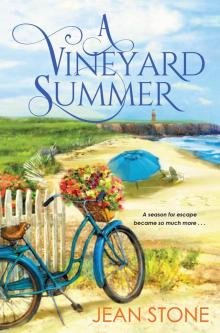 A Vineyard Summer
A Vineyard Summer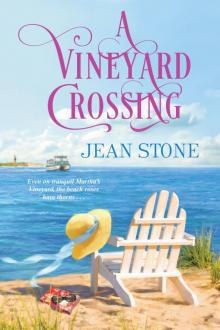 A Vineyard Crossing
A Vineyard Crossing A Vineyard Christmas
A Vineyard Christmas Beach Roses
Beach Roses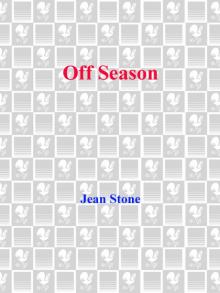 Off Season
Off Season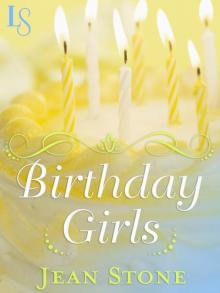 Birthday Girls
Birthday Girls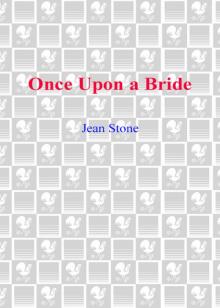 Once Upon a Bride
Once Upon a Bride Places by the Sea
Places by the Sea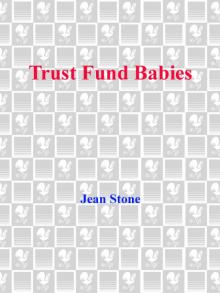 Trust Fund Babies
Trust Fund Babies The Summer House
The Summer House Tides of the Heart
Tides of the Heart Sins of Innocence
Sins of Innocence Four Steps to the Altar
Four Steps to the Altar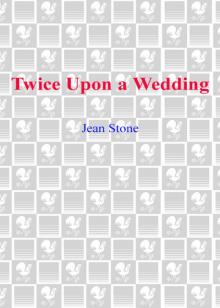 Twice Upon a Wedding
Twice Upon a Wedding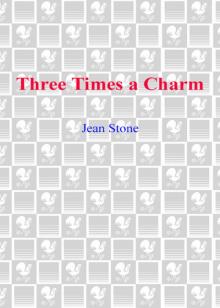 Three Times a Charm
Three Times a Charm